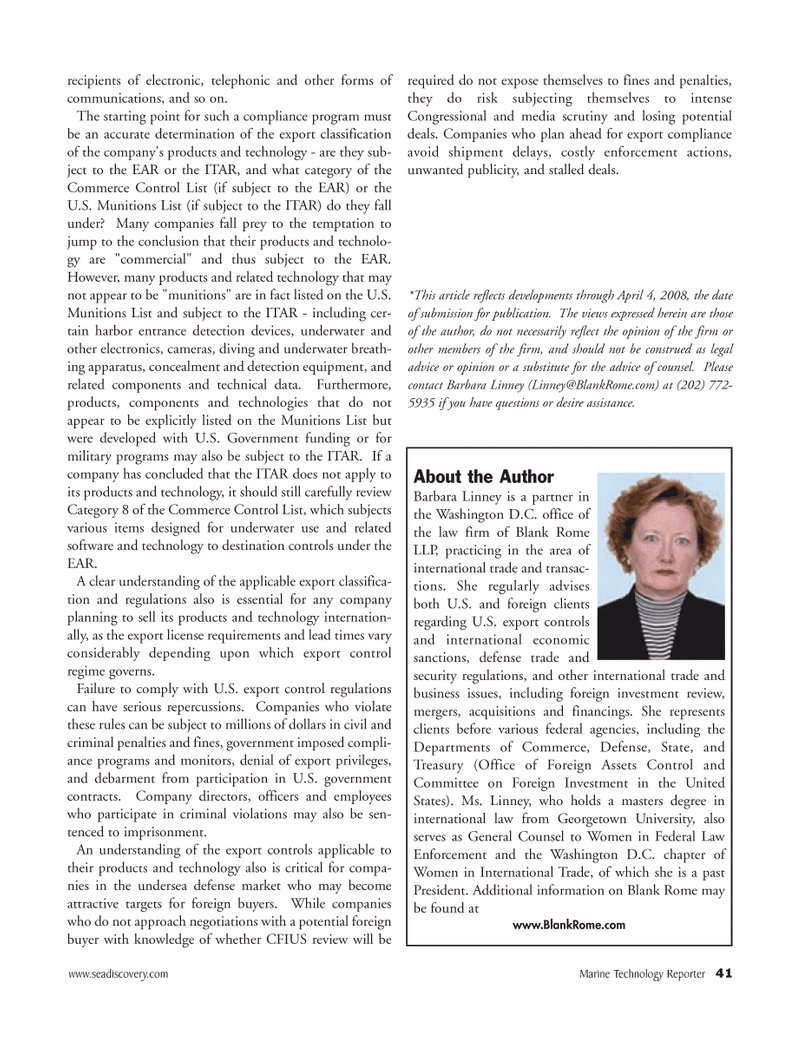
Page 41: of Marine Technology Magazine (May 2008)
Undersea Defense Edition
Read this page in Pdf, Flash or Html5 edition of May 2008 Marine Technology Magazine
www.seadiscovery.com Marine Technology Reporter 41 recipients of electronic, telephonic and other forms of communications, and so on.
The starting point for such a compliance program must be an accurate determination of the export classification of the company's products and technology - are they sub- ject to the EAR or the ITAR, and what category of the
Commerce Control List (if subject to the EAR) or the
U.S. Munitions List (if subject to the ITAR) do they fall under? Many companies fall prey to the temptation to jump to the conclusion that their products and technolo- gy are "commercial" and thus subject to the EAR.
However, many products and related technology that may not appear to be "munitions" are in fact listed on the U.S.
Munitions List and subject to the ITAR - including cer- tain harbor entrance detection devices, underwater and other electronics, cameras, diving and underwater breath- ing apparatus, concealment and detection equipment, and related components and technical data. Furthermore, products, components and technologies that do not appear to be explicitly listed on the Munitions List but were developed with U.S. Government funding or for military programs may also be subject to the ITAR. If a company has concluded that the ITAR does not apply to its products and technology, it should still carefully review
Category 8 of the Commerce Control List, which subjects various items designed for underwater use and related software and technology to destination controls under the
EAR.
A clear understanding of the applicable export classifica- tion and regulations also is essential for any company planning to sell its products and technology internation- ally, as the export license requirements and lead times vary considerably depending upon which export control regime governs.
Failure to comply with U.S. export control regulations can have serious repercussions. Companies who violate these rules can be subject to millions of dollars in civil and criminal penalties and fines, government imposed compli- ance programs and monitors, denial of export privileges, and debarment from participation in U.S. government contracts. Company directors, officers and employees who participate in criminal violations may also be sen- tenced to imprisonment.
An understanding of the export controls applicable to their products and technology also is critical for compa- nies in the undersea defense market who may become attractive targets for foreign buyers. While companies who do not approach negotiations with a potential foreign buyer with knowledge of whether CFIUS review will be required do not expose themselves to fines and penalties, they do risk subjecting themselves to intense
Congressional and media scrutiny and losing potential deals. Companies who plan ahead for export compliance avoid shipment delays, costly enforcement actions, unwanted publicity, and stalled deals. *This article reflects developments through April 4, 2008, the date of submission for publication. The views expressed herein are those of the author, do not necessarily reflect the opinion of the firm or other members of the firm, and should not be construed as legal advice or opinion or a substitute for the advice of counsel. Please contact Barbara Linney ([email protected]) at (202) 772- 5935 if you have questions or desire assistance.
About the Author
Barbara Linney is a partner in the Washington D.C. office of the law firm of Blank Rome
LLP, practicing in the area of international trade and transac- tions. She regularly advises both U.S. and foreign clients regarding U.S. export controls and international economic sanctions, defense trade and security regulations, and other international trade and business issues, including foreign investment review, mergers, acquisitions and financings. She represents clients before various federal agencies, including the
Departments of Commerce, Defense, State, and
Treasury (Office of Foreign Assets Control and
Committee on Foreign Investment in the United
States). Ms. Linney, who holds a masters degree in international law from Georgetown University, also serves as General Counsel to Women in Federal Law
Enforcement and the Washington D.C. chapter of
Women in International Trade, of which she is a past
President. Additional information on Blank Rome may be found at www.BlankRome.com
MTR#4 (33-48).qxd 5/13/2008 10:26 AM Page 41

 40
40

 42
42
